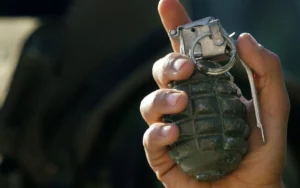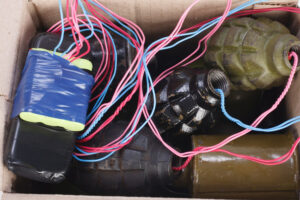Destructive Device Defense Lawyers in Hackensack NJ
 Destructive devices are prohibited weapons in New Jersey. Destructive devices are objects created to cause an uncontrolled explosion. Weapons such as grenades, mines, and bombs are destructive devices. Weapons able to fire projectiles greater than 60 calibers, except for shotguns used for sporting purposes, are illegal. Rockets with more than four ounces of propellant are prohibited. Missiles with an explosive or incendiary charge of more than an ounce are also unlawful. Molotov cocktails, breakable containers filled with an accelerant, and containing a wick are forbidden. The fabrication or simple possession of any of these items is prohibited.
Destructive devices are prohibited weapons in New Jersey. Destructive devices are objects created to cause an uncontrolled explosion. Weapons such as grenades, mines, and bombs are destructive devices. Weapons able to fire projectiles greater than 60 calibers, except for shotguns used for sporting purposes, are illegal. Rockets with more than four ounces of propellant are prohibited. Missiles with an explosive or incendiary charge of more than an ounce are also unlawful. Molotov cocktails, breakable containers filled with an accelerant, and containing a wick are forbidden. The fabrication or simple possession of any of these items is prohibited.
When confronted with a weapons charge in Fort Lee, Hackensack, Bergenfield, Paramus, Rutherford, Edgewater, Lyndhurst, or another town in or surrounding Bergen County, it is of utmost importance to enlist the assistance of a seasoned criminal defense lawyer. Contact us now for a complimentary consultation by calling (201)-330-4979. Our legal practice focuses on the defense of individuals facing weapons charges such as possession of a weapon for an unlawful purpose, as well as other crimes throughout Northern New Jersey. We comprehensively understand the laws and intricate elements concerning destructive devices and will put this to use for your defense.
A Closer Look At Destructive Devices in New Jersey
One destructive device seen by police that is extremely dangerous is a grenade. Most are familiar with the military-style grenade, where a pin is pulled to detonate the device, but grenade launchers use large cartridges that explode on impact. Rockets and missiles aren’t commonly seen on the streets. Rocket launchers are usually only found under military protection and cannot be purchased under any circumstances. Hopefully, the only rockets seen regularly come from a school’s playground during the science fair.
Homemade mines and bombs are more common, unfortunately. A few mouse clicks can teach someone how to build these bombs. The bombers responsible for the Boston Marathon Incident learned how to make bombs using a pressure cooker, explosives, and shrapnel in the form of ball bearings, screws, and nails. In this incident, 3 people were killed, and 280 were injured, 14 of whom suffered amputations. Those implicated for the crimes claimed to have learned online how to make the bombs and detonate them with remote control from a toy car.
Molotov cocktails are the most common destructive devices. They are made by using a glass bottle or other glass container, filling it with flammable liquid, and placing a rag in the bottle with a segment outside the bottle acting as a wick. Molotov cocktails are easy to make and are often seen during riots and protests. They can damage property extensively because the flammable liquid is dispersed when the glass breaks and catches fire.
Charges for Illegal Possession of a Destructive Device in NJ
Possessing a destructive device is illegal in New Jersey, unless one of the limited exceptions to the law applies. The offense violates N.J.S.A. 2C:39-3a, a statute including an array of prohibited weapons and devices, and is considered a third degree crime.
Legal Exceptions to Destructive Device Possession Per NJ Law
There are several exceptions to this law. While on active duty and in accordance with the orders from their superior officer and applicable laws, members of the Armed Forces or the National Guard can possess destructive devices. Law enforcement officers transporting confiscated destructive devices taken as evidence during the commission of a crime or because it was possessed illegally. For this, the officer’s superiors must be notified and have given their permission to transport the device.
Unloaded antique cannons being transported for repair from their usual location do not fall under this law as illegal as long as the owner is legally eligible to own it. Suppose the cannon is to be used for an exhibition or demonstration. In that case, a 30-day notice must be submitted to the superintendent of police, and transportation of the cannon to and from the event is also allowed.
Proving a Destructive Device Possession Offense in New Jersey
One cannot see knowledge, as it is a mental process. However, knowledge can be determined by a defendant’s conduct or actions. States of mind cannot be demonstrated as visible evidence, but the defendant’s actions and words can infer them. The defendant must know that they had the item in their possession. The law names two kinds of possession: actual possession and constructive possession. Actual possession means the defendant is in possession of the destructive device, knows what it can do, and has it in their possession at a particular time. Constructive possession is when the defendant doesn’t have the destructive device but has knowledge of its location and intends to possess it directly or through others.
Consequences For Possession of a Destructive Device
Illegal possession of a destructive device carries a third degree charge and may result in a 3 to 5-year sentence and a fine of up to $15,000.
Possessing a Destructive Device with Unlawful Intent in New Jersey
 This charge requires three facts to apply. The defendant possessed a destructive device; they planned to use it to harm someone else or destroy someone’s property, and law enforcement legally obtained all evidence of the illegal activity. First, the defendant must be found possessing the destructive device and having physical custody of it on their person, in their car, or residence. Next, it must be proven that the defendant had an unlawful intent to use the destructive device to cause harm, destroy property, or participate in criminal activity. Thirdly, the defendant must have had prior knowledge that the device was destructive or explosive in nature.
This charge requires three facts to apply. The defendant possessed a destructive device; they planned to use it to harm someone else or destroy someone’s property, and law enforcement legally obtained all evidence of the illegal activity. First, the defendant must be found possessing the destructive device and having physical custody of it on their person, in their car, or residence. Next, it must be proven that the defendant had an unlawful intent to use the destructive device to cause harm, destroy property, or participate in criminal activity. Thirdly, the defendant must have had prior knowledge that the device was destructive or explosive in nature.
Possible Penalties For Destructive Device Possession with Unlawful Purposes
Possession of a destructive device with the intent to hurt others or destroy property is a second degree offense that carries a possible sentence of 5-10 years and a fine of up to $150,000.
Contact a Paramus Destructive Device Lawyer to Defend Your Case
The penalties for possessing a destructive device are serious. You need a strong criminal defense attorney in your corner who is familiar with the law and a pro at litigating in a courtroom. Our criminal weapons lawyers are renowned in their field and have defended hundreds of clients facing destructive device charges and many others in Englewood, Mahwah, Teaneck, Ridgefield, Lodi, Palisades Park, Garfield, and other towns in the greater Bergen County area. We will tailor your defense to fit your unique situation.
We can advise you of your rights, possible defenses, and what your options are. Our defense team will work with you to develop a plan for your defense. Call us today for your free consultation at (201)-330-4979 or contact us online.


